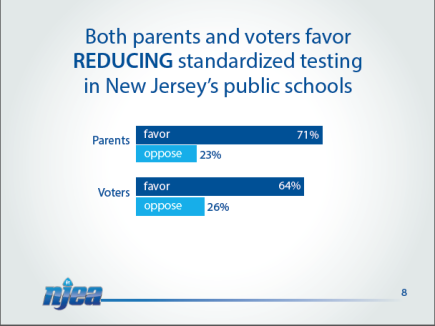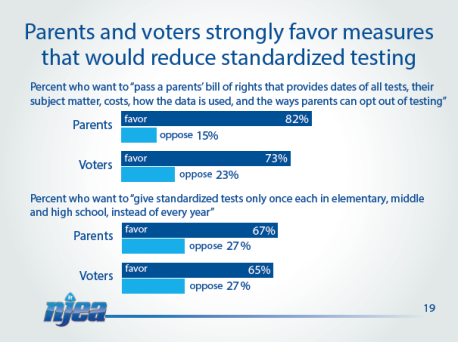I started teaching at the genesis of the No Child Left Behind era long before I understood the impact it would have on our education system and schools. Prior to beginning my teaching career, I did a lot of substituting at Warren Street School in Newark, New Jersey and started teaching full-time in Jersey City at one of the high schools. Warren St. was my neighborhood school growing up, but my mom chose to send my siblings and me to nearby Catholic schools. I had neighbors who attended Warren St., but never got to step foot into the building until I was twenty years old. It was at this school that I was truly exposed to urban school reform.
I was introduced to the scripted curricula Success For All (SFA) and could not believe how much money went into these packaged programs for teachers. The program had a math and reading component that forced teachers to follow a strict pacing guide of skills all in the name of improving test scores for students. It required no real thinking from the teachers, no creativity, and there was no room for spontaneity from either student or teacher. It had no room for all those things that make us human. Nope, “it ain’t have time for that!”
Because I was a long term substitute at this SFA school, I became very familiar with the program and started seeing the negative impacts that State control had on school districts. I saw the impact that “failed” test scores had on students of color, particularly schools in districts where the State had significant control. These schools went through one reform model after another every three years, never dealing with the systemic issues that plague many of those schools.
The increase in efficiency models where everything must be measured and weighed were tested in our largely black and brown neighborhoods first, particularly ones that had large populations of people from low-socioeconomic backgrounds. A friend of mine would often joke around and say that Newark was always the testing ground for what would happen in Jersey City, Paterson, and any of the other then Abbott districts. Anytime Newark adopted some absurd efficiency model, like attaching standards to bulletin boards or using scripted curricula, we would jokingly wait in anticipation for it to reach Jersey City (my former district). And it always did.
My years in an Abbott district were full of test prep classes, upon classes and weekend test prep. Students were often rewarded with movie tickets for those who attended, or punished with detention for those who did not attend. When students failed to attend detention, they would be assigned suspension for missing the Saturday test prep classes. Punishment, upon punishment, became the modus operandi of schools, especially when it came to testing, and preparing students for the tests.
The test-drill and punish culture of schooling has suddenly come to an ugly head, and it took it seeping into the mostly white higher socio-economic districts before wide-spread resistance took form. While districts such as Newark have either had their schools closed, co-located by charter schools, or even straight up looted from the people in the community, many people in New Jersey saw those issues as a Newark-only problem. And for many, they could not personally be bothered with Newark’s issues. It is important to note that the issues that Newark has experienced comes from years of systemic oppression and inequity that manifest into years of systemic ills such as resource-deprived and low-performing schools. Any researcher would tell you that schools are reflections of their communities. If a community is struggling and experiencing a plethora of ills, it is to be expected that the school will reflect those very same ills. This does not mean that there aren’t things the school can do provide the necessary resources to better support the students and their families, but we would be negligent if we did not acknowledge the challenges.
It’s ridiculous to think that when humans–our students walk into a learning environment that they can be expected to shed everything they experience outside the school community. Here is the ugly truth that much of the United States wants to ignore: you can’t fix schools with more standardized testing. Anyone who looks at New Jersey’s Best School Districts can easy see the story it tells. It tells a story of de facto segregation, racism, and inequity. When I look at that list, I am quickly reminded that our country has a long way to go. I am quickly reminded that there are certain privileges that some are handed while purposely withheld from others, and those top 100 school districts are a reflection of the residuals of a system design to disadvantage brown and black folks in the United States.
Additionally, as the State anted up the consequences tied to low test performance, schools and districts began to invest significant sums of money in test-prep courses, materials, and consultants. Consequently, they increased the pressure on teachers while also punishing students. We also began to see students lose elective courses that were replaced with special classes geared toward improving the students’ performance on the State standardized tests. Sometimes these special classes were in the form of four-hour Saturday classes two months before the tests.
For most students in those test-prep courses, it became a stigma and a dreaded place for both students and teachers. It became a place of embarrassment for the students because it was clear to all the other students that they were not “proficient” on the tests. Most of those students would rarely ever see the inside of elective classes because, for many, the test prep class replaced the elective. It has gotten to the point where students think that the purpose of school is to pass standardized tests.
And where does that leave us?
Well, quite frankly, New Jersey parents and taxpayers have had enough of the stress, and punishments their children, schools, teachers, and districts have had to endure. For some school districts, the results are dire and have resulted in school closures leaving many children without neighborhood schools.
Let’s look at the recent poll conducted by the Mellman Group, out of Washington, D.C. When the participants were asked how much emphasis was placed on standardized testing, 62 percent of voters and 71 percent of parents responded there was too much emphasis as well.
When voters were asked if they were in favor of reducing standardized testing in NJ public schools, 71 percent of parents and 64 percent of voters stated they were in favor.
The next graph is one that is not really shocking to many teachers, but may be an eye-opener for those who either don’t have children in the public schools or who have not been paying attention to the debate:
So voters and parents are worried about the children. It doesn’t take a rocket scientist to figure out that this very unnatural tool being used to assess our students is having a negative impact on our them, and the schools they attend. If you think about it, public education is possibly the only place where parents are expected to give their children up with no questions asked, even when the schools impose such abusive policies around excessive testing. Parents are expected to “put-up or shut-up” even when we know something is terribly wrong with a system that is abusive to our children. Okay, lemme adjust my glasses because I’m having a moment that leaves me with only one question:
Some may say, “How could you possibly liken excessive standardized testing to child abuse?” Well let’s take a look. Children were designed by nature to learn and explore the world through play and hands-on activities that allow for self-expression and exploration. I mean this is the foundation of Piaget, Montessori, Vygotsky, Freire, and more. We also know that learning is a social construct and needs to happen in environments that help develop the whole child. Life is not compartmentalized, so who make schools, learning, and the ways in which we assess student learning in unnatural and inorganic ways?
This brings me to my point: parents and voters saying their are fed up and are in favor of a Parents’ Bill of Rights. A Parents’ Bill of Rights will place the power back into the very people who care most about the children. Let’s be honest, testing companies care only about their bottom line. They have teams of people plotting and thinking up ways to increase profits without care for the human beings who may be affected by any of their decisions. Testing and publishing companies have figured out ways to make money off of our children, and the only people who can protect our children from them are the parents.
And this is what parents would like:
For the most part, I am very pleased with this potential Parents’ Bill of Rights. I would only slightly change the first one. It reads, “High-stakes consequences should not be attached to statewide standardized tests, and the 2015 PARCC should be utilized as a statewide pilot.” As I mentioned early, there are far reaching consequences of standardized tests. But what I did not mention was there are also rewards for some schools and districts that reach certain benchmarks on these standardized tests. Now, if we know these tests to be linked to wealth, then by providing rewards we are by default punishing schools and districts that do not meet those benchmarks on standardized tests. Besides that, I wholeheartedly stand behind this push for a parents’ bill of rights, and I hope you can see a need for it as well.
For the first time in a very long time, I am seeing parent take back the power they once had, and this my friends is what democracy looks like.








Well said and brilliantly written
LikeLike
Ah, thanks Deb!!
LikeLike